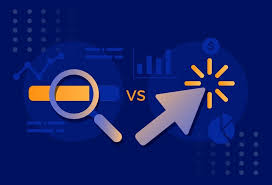What is SEO and PPC?
SEO (Search Engine Optimization) and PPC (Pay-Per-Click) are two essential digital marketing strategies that businesses use to increase their online visibility and drive traffic to their websites.
SEO (Search Engine Optimization)
SEO is the process of optimizing a website to improve its ranking in search engine results pages (SERPs). By incorporating relevant keywords, creating high-quality content, improving website speed, and building backlinks, businesses can enhance their organic search visibility. SEO helps websites attract organic traffic from search engines like Google, Bing, and Yahoo.
PPC (Pay-Per-Click)
PPC is a digital advertising model where advertisers pay a fee each time their ad is clicked. This form of online advertising allows businesses to bid on keywords relevant to their target audience and display ads on search engines or other platforms. PPC campaigns can be highly targeted, offering businesses the opportunity to reach specific demographics and drive immediate traffic to their websites.
The Difference Between SEO and PPC
The main difference between SEO and PPC lies in how website traffic is generated. SEO focuses on optimizing a website’s content and structure to rank organically in search results, while PPC involves paying for ad placements to drive immediate traffic. Both strategies have their advantages and can complement each other in a comprehensive digital marketing strategy.
Conclusion
In conclusion, SEO and PPC are powerful tools that businesses can leverage to enhance their online presence, attract quality traffic, and ultimately increase conversions. Understanding the nuances of both strategies and implementing them effectively can help businesses achieve their marketing goals in today’s competitive digital landscape.
Understanding SEO and PPC: Key Differences, How They Work, and Their Role in Marketing
- What is SEO and how it works?
- What is the difference between SEO and PPC?
- How does SEO work with PPC?
- What is PPC in marketing?
What is SEO and how it works?
Search Engine Optimization (SEO) is the practice of optimizing a website to improve its visibility in search engine results. By strategically incorporating relevant keywords, creating high-quality content, and building backlinks, SEO aims to increase a website’s organic traffic. Search engines like Google use complex algorithms to determine the ranking of websites in search results based on various factors such as keyword relevance, content quality, and user experience. Therefore, SEO works by aligning a website’s structure and content with these algorithms to enhance its chances of appearing higher in search engine results pages and attracting more organic traffic.
What is the difference between SEO and PPC?
When comparing SEO (Search Engine Optimization) and PPC (Pay-Per-Click), the key difference lies in how website traffic is generated. SEO involves optimizing a website’s content and structure to improve organic search engine rankings, driving traffic through unpaid search results. On the other hand, PPC is a form of paid advertising where businesses pay for ad placements and only incur costs when users click on their ads. While SEO focuses on long-term organic visibility, PPC offers immediate visibility with targeted ads. Both strategies have unique advantages and can be strategically combined to maximize online presence and drive quality traffic to websites.
How does SEO work with PPC?
SEO and PPC can work together synergistically to maximize a business’s online visibility and drive targeted traffic to their website. While SEO focuses on optimizing a website’s organic search presence through content, keywords, and backlinks, PPC complements this by providing immediate visibility through paid ads. By strategically aligning SEO efforts with PPC campaigns, businesses can dominate search engine results pages, increase brand awareness, and attract a diverse range of potential customers. Additionally, data from PPC campaigns can inform SEO strategies, helping businesses refine their keyword targeting and content optimization for better long-term organic results. Ultimately, integrating SEO and PPC allows businesses to create a comprehensive digital marketing strategy that yields optimal results in today’s competitive online landscape.
What is PPC in marketing?
PPC, which stands for Pay-Per-Click, is a digital marketing strategy where advertisers pay a fee each time their ad is clicked. It is a form of online advertising that allows businesses to bid on specific keywords relevant to their target audience and display ads on search engine results pages or other platforms. PPC campaigns are highly customizable and offer businesses the flexibility to control their budget, target specific demographics, and track the performance of their ads in real-time. By leveraging PPC in marketing, businesses can drive immediate traffic to their websites, increase brand visibility, and generate leads effectively in today’s competitive digital landscape.

